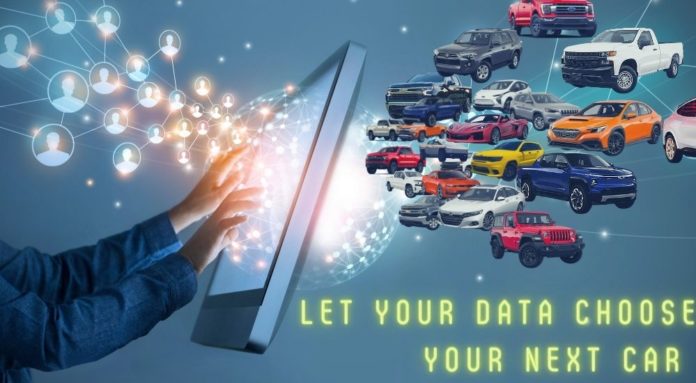Suffolk, VA – Your personal data has become the backbone of the new economy. Somehow a generation raised with the specter of stranger danger has built a system where accepting cookies from faceless corporations is a part of everyday life. While moderately less likely to result in kidnapping, these sort of data-mining endeavors give big businesses an unprecedented look into our personal lives, desires, and most importantly, shopping habits. As companies work on ways to exploit this information, one Suffolk Chevy Silverado dealer is partnering with an auto sales website to launch a new program that will turn this data into a can’t-miss recommendation for a new vehicle.
Developed in partnership with Facebook and Google and various totalitarian regimes, the Consumer Retail Evaluation and Elucidation Program (CREEP) tracks a potential buyers’ data as they traipse across the internet, logging everything from shoe size and favorite color to your angsty LiveJournal entries from 2003. The data is then synthesized into a tailor-made vehicle recommendation, the accuracy of which has even surprised some users.
“I put on a tough front at the job site, chewing tobacco and wearing those stiff-as-hell Carhartts, but you can’t hide who you are on the internet,” says CREEP user Mike Pembroke. “I’d always just driven pickups thanks to peer pressure, but CREEP found my Tumblr page and suggested I might be much happier in something like a Mazda Miata. It also discovered that I might be something called a ‘Bro-ny,’ whatever that is. Sounds pretty cool, though.”
The ability to customize a vehicle to a driver’s unique––even subconscious––needs makes the invasion of privacy a small price to pay for many. “It’s been really helpful, actually. I’ve tried it the regular way in the past: doing a little research online, taking a test drive, and then making a panic buy after too much-sustained eye contact from the salesperson, but thanks to CREEP, I love my new car,” says Mariah Prince. “I was originally going to go with a smaller sedan, but after analyzing my twerking videos on TikTok, it suggested that I might be happier in a vehicle with a wider driver’s seat.”
Naturally, privacy concerns abound, though many users feel the paranoia is somewhat overblown. “People are always ‘big brother’ this and ‘big brother’ that, but I for one love my big brother. Much like this website, he gave me some pivotal advice when it came time to buy a new car, though the algorithm isn’t nearly as chill about buying beer for my friends and I,” says Seth Poelher, whose parents say that if you’re going to drink, they’d rather you do it in the house.
The CREEP experience hasn’t worked out quite so well for all users. Upon reviewing one driver’s YouTube history containing a troubling mix of ASMR, pimple-popping, and conspiracy theory videos, the app flagged the user, and his driver’s license was soon revoked by the state. “There are some people who just shouldn’t be allowed to move about society quite so freely,” ruled a district judge following an appeal from the driver.
Others have had their options limited thanks to CREEP’s ability to comb through a user’s credit score and other personal financial information. Casey Gorman was in the market for a new top-of-the-line Range Rover, but prevented from browsing vehicles in that price range thanks to a built-in filter. “I kept clicking on the new 2022 model, and the link kept taking me to the login page of my student loan provider. I thought it must be some sort of glitch, but when I followed up with customer support, they said any credit scores in the double digits were prevented from searching for certain vehicles,” says Gorman.
Nominally developed as a car-selling tool, the organizations behind the website are keeping their options open if future economic developments require it to pivot its business model. While the specific term “blackmail” doesn’t appear in the start-up’s prospectus, it does make several allusions to the fact that any sufficiently embarrassing data can be sent to a user’s mother-in-law should certain monetary conditions not be met.
“This shouldn’t be that surprising to anyone who’s actually read the Terms & Conditions of any app they’ve ever used, but everything ‘free’ on the internet is essentially paid for with your private data,” says Lance Runyon, digital privacy specialist at the law firm Bradbury + Orwell. User’s failure to dive into such an app’s dense legal-ese has been a boon for attorneys like Runyon, who recently purchased a ski chalet thanks to a settlement with Candy Crush.
“It’s everywhere at this point. DoorDash actually has naming rights for your first-born child, and Uber has a clause buried in it that gives them the right to harvest your organs. Luckily for investors, these two client bases are typically either too hungry or drunk to read the fine print,” says Runyon.












